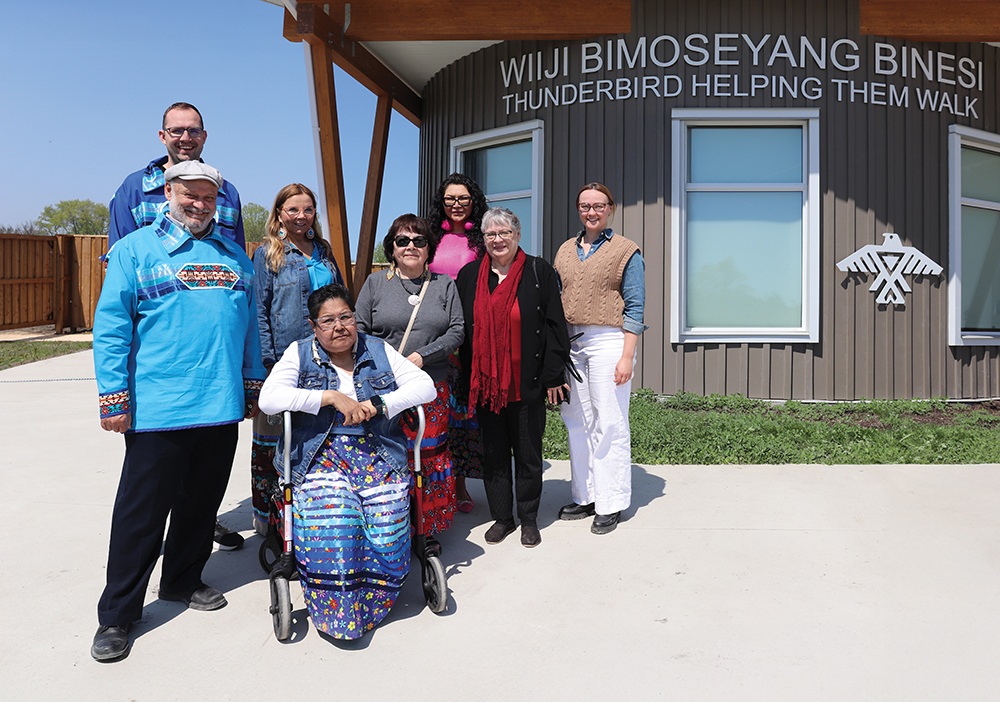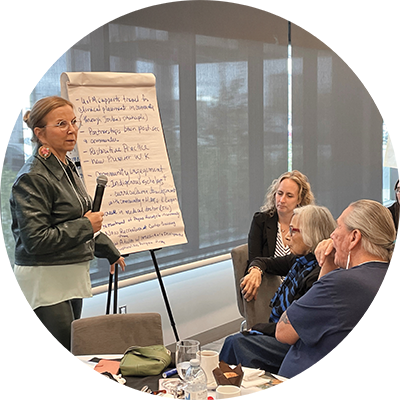
Two major wellness initiatives were officially launched this spring in Manitoba First Nations communities – part of a fruitful ongoing partnership with the UM College of Rehabilitation Sciences.
The first initiative is Wiiji Bimoseyang Binesi (Thunderbird Helping Them Walk), a 10-unit housing complex in Sagkeeng First Nation designed for adults who have lived with disability and homelessness.
The second is Grow Our Own Specialists through Education (GOOSE), an initiative to address the shortage of rehabilitation health-care professionals in Manitoba’s north, and the overall underrepresentation of Indigenous people in rehab careers.
Both projects arose from Kiga mamo anokimin onji minoayawin / Ka mamawiatoskatenow minoyin (translated from Ojibwe and Cree as “We will work together for health and wellness”), a partnership between the College of Rehabilitation Sciences and more than a dozen Manitoba First Nations communities.
The Wellness partnership spans more than 25 individual projects assisted by more than 10 faculty members and 85 students.
It started in 2016 with a $40,000 grant from the UM Indigenous Initiative fund, with support from the Manitoba First Nation Education Resource Centre.
“The idea was to go out to communities and begin a conversation,” said Dr. Reg Urbanowski, dean of the college. He worked with Debra Beach Ducharme [B.Ed/85, M.Ed/09], director of Indigenous health integration at Ongomiizwin – Education, to connect with communities.
Beach Ducharme, an educator who is a member of Lake Manitoba First Nation, had been hired to help the Rady Faculty of Health Sciences implement the health-related Calls to Action made by the Truth and Reconciliation Commission of Canada.
She and Urbanowski saw collaborating with First Nations communities as much-needed reconciliation work that would address health inequities while also educating students and faculty members about Indigenous ways of knowing and being.
Two of the initial goals of the Wellness partnership were to increase access to rehabilitation services in Indigenous communities and to recruit Indigenous people to the field.
“Who better can serve the community than our own people?” said Beach Ducharme.
Starting with Pinaymootang First Nation, Lake Manitoba First Nation, Norway House Cree Nation, Bloodvein First Nation, Brokenhead Ojibwe Nation and Misipawistik Cree Nation, the UM team met with chiefs, council members and health teams in the communities.
The approach was to establish a trusting relationship and discuss communities’ specific needs, which sometimes extend beyond health care.
Initiatives have ranged from a dementia project funded by the Public Health Agency of Canada to a food security initiative funded by Protein Industries Canada, and from a heart and health initiative to a playground and walking trail (read more).
What’s more, the partnership has connected First Nations communities with other UM faculties, including social work, engineering, architecture and business.
“It’s about whatever the community needs and bringing in the right resources,” Urbanowski said. “It’s not just rehabilitation anymore.
“These initiatives belong to the communities, and we assist them with what they need.”
Wiiji Bimoseyang Binesi
The Wiiji Bimoseyang Binesi housing complex had its grand opening on May 22. Sagkeeng community members Audrey Henderson and Sharon Courchene were the main drivers behind the project. They were hired in 2017 by Sagkeeng Health Centre to research the needs of people living with disabilities in four communities: Brokenhead, Black River, Hollow Water and Sagkeeng.
“We did a lot of community engagement and we saw a lot of homelessness in people living with disabilities – both physical and disabilities that you can’t see,” Henderson said.
The College of Rehabilitation Sciences helped develop the project concept and proposal and continues to support it through several student initiatives, including a day program at the complex for adults with disabilities.
Margaret Hart [M.Ed./21], Indigenous scholar (Ininiw) in the college, said that through this project, occupational therapy students are walking alongside First Nations communities in a shared journey of advocacy, relationship-building and the co-creation of culturally safer care.
The housing facility, she said, “creates a place of connection where students are invited to listen, learn and respond to the lived realities of Indigenous Peoples.”
GOOSE
Headed by Opaskwayak Cree Nation (OCN) in The Pas area, Grow Our Own Specialists through Education (GOOSE) promotes careers in rehabilitation sciences to students starting in Grade 7.
The initiative has grown to include eight other First Nations communities and received $1.5 million in funding from UM through its $16.1-million partnership with the Mastercard Foundation’s EleV Program.
Marlene Head [BSW/00], postsecondary supervisor for OCN, was one of the initial visionaries of the program, along with Bev Fontaine, director of education for OCN, and Jen Bercier, principal at Oscar Lathlin Collegiate, where a launch ceremony was held on May 26.
In a related effort, OCN also approached community members who had an interest in rehabilitation careers to apply to UM.
“It was very difficult for them to agree to moving to the city, so we offered enhanced supports, paid their rent and offered subsidies and incentives at the end of each term,” Head said.
This fall, three students from OCN are set to graduate from the master’s program in occupational therapy.
One of them is Yvonne Fenner, a longtime teacher. She is looking forward to returning to one of the community’s schools in a new capacity after completing the program.
“I’ll still be doing what I originally wanted to do, which is helping the students,” she said. “I’ll just be doing it in a different way.”

Celebrating Relationships
A key element of the Wellness partnership is a twice-yearly, two-day retreat. Many initiatives have been sparked at these events, which are attended by First Nations community members, UM faculty and invited guests.
“When we get together, we celebrate our relationships. And it’s those relationships that generate the initiatives the communities need,” said Dr. Reg Urbanowski, dean of the College of Rehabilitation Sciences.
Guests have included representatives from First Nations communities outside Manitoba, Canadian universities, and organizations including March of Dimes, the Heart and Stroke Foundation of Canada and Tech Access Canada.
“We’ve also had guests from as far away as Russia, Chile, the Netherlands and New Zealand visit communities and attend gatherings to share their Indigenous knowledge and cultural practices,” Urbanowski said.
The gatherings begin with each community sharing some of the successes of their health and wellness projects.
“That really positions those communities as experts,” said Michael Redhead Champagne, an Ininiw community leader from Winnipeg who hosts the retreats.
Champagne praised Urbanowski and his UM team for their commitment to respectful collaboration.
“They approach this work from a relationship-based perspective and believe that the residents of the communities are the experts in what they need. This is why we’re seeing innovative projects like GOOSE take flight.”
BY ALAN MACKENZIE
